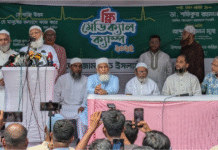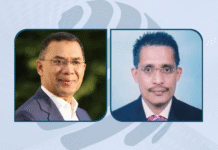Mumtaz Iqbal
Most domestic and international comments on our unique elections reeked of doom and gloom. However, this is only part of the story. Below are given some lesser-publicised comments by various institutions that have not received the publicity they deserve. The disenfranchised Bangladesh electorate may take heart that the world has not forsaken them.
IMS (www.ims.com)
International Magicians Society (IMS) (www.ims.com) Chairman & Chief Executive Officer, Cypriot-born Tony Hassini of 581 Ellison Avenue, Westbury, NY 11590 fulsomely praised Sheikh Hasina’s marvellous illusion in pulling of a landslide election victory by hypnotising and mesmerising the peoples of Bangladesh. Such a feat is unparalleled in the history of magic and far exceeds the accomplishments of world-class practitioners like David Copperfield (magician, not the Dickens novel). Hassini confirmed that Hasina has been unanimously elected as an IMS honorary member, an honour extended to few politicians and even fewer females, but hasn’t heard back whether or not she has accepted.
However, Hassini said that the Prime Minister’s Office has declined his request to send a high-powered delegation to learn PM Hasina’s closely-guarded secret in manipulating elections, despite guaranteeing complete confidentiality. But the PMO helpfully suggested that the IMS direct this enquiry to the Indian foreign Minister Salman Khurshid who recently asserted modestly but unequivocally on India’s special role in Bangladesh because of “…Our (Indian) understanding of the region and understanding of sentiments of the people in the region…”
However, despite numerous efforts to contact Minister Khurshid, Hassini said he was unable to get through. No doubt the Minister is fully occupied with l’affaire Devyani Khobragade. As a tax-paying American, Hassini’s really disappointed that the US authorities played such a shameful role in humiliating Devyani (handcuffing, strip searching et al) over, of all things, her so-called “mistreatment” of her Indian nanny. Hassini pointed out that South Asian diplomats do so regularly with impunity. So why was an Indian diplomat singled out?
Hassini says that he’s shocked that there’s so little respect for the Vienna Convention nowadays! With Minister Khurshid’s masterly display of anthropological acumen about neighbours, he wondered what happened to Kautilyan realism in Chanakyapuri?
Praise for Chief election Commissioner (CEC)
Behind every successful man is a remarkable woman. By the same token, behind every successful election held under a woman PM is a man of sterling qualities. And that distinguished person in Bangladesh is the CEC, with the Imamate coming a close second.
Our successful elections held with military efficiency and financial economy has dazzled the world. The CEC has received requests from all over the globe on how he achieved this remarkable feat. With his trademark unflappable modesty, the CEC acknowledged these requests and said that he was inspired and guided by the spirit of the Liberation War participants. He couldn’t let their sacrifices go in vain. And he was happy to note that the Bangladeshi voters, who valiantly resisted the brute Pakistani hordes, had seen fit to return the Awami League to power in a transparent election conducted under difficult circumstances with a respectable turnout.
The AL had been at the forefront of monopolising the spirit and fruits of the Liberation War fostered under Bangabandhu’s courageous leadership, even though that nasty general Yahya had him locked up in Pakistan and tried on spurious charges of treason in 1971. But truth and right eventually prevail, opined the CEC, or his name is not Kazi (registrar) or Raquib (captain).
When pressed, the CEC admitted bashfully that the Election Commission (EC) was preparing a handbook on how to hold such elections, especially in Least Developing Countries (LDCs) who could least afford the unholy burden of expensive elections. India’s RAW was the technical consultant for the book whose title, aptly, would be: Selections, not Elections—the Way Forward Subtitled: Janpath Not Westminster. RAW held the worldwide patent for this software but had supplied it gratis to Bangladesh as a good-neighbourly gesture.
The CEC was adamant that we have to discard the Westminster Model, which was a colonial relic unsuited to the genius of Bangladeshis. The Janpath Model, marrying massive popular participation with Gandhian non-violence, was a vast improvement on violence-prone Guided or Basic Democracy of Sukarno and Ayub.
As a public service, the CEC said that this Handbook would be distributed free of charge to all 186 UN members and believed that most of them except for some decadent desert monarchies would find it useful and practical. Two ingredients indispensable for the successful Bangladesh “selection”, the CEC pointed out, were a plentiful supply of rubber stamps and physically-fit Returning Officers with muscular arms.
When a reporter enquired about the rumour that the United Nations had approached him to become its lead consultant on holding elections in emerging democracies, the
CEC indignantly denied it, saying that it was all moonshine. However, he conceded that the US Congress-funded National Endowment for Democracy had enquired discreetly whether it could avail of his services. That’s because Americans love a winner! CEC said that following the Yunus precedent, this decision was not his to make, since it depended on PM Hasina and whether Delhi gave clearance, since it had a patent to protect.
Paris press conference
Not enough is known of the press conference given by the Quai d’Orsay (French Foreign Office) shortly after the Bangladesh elections. In response to a question, the press spokesman clarified that the collaborationist Vichy Government under Marshal Petain and PM Pierre Laval was established on 22 June 1940 following the Armistice at Compiegne after Germany defeated France in the six weeks war lasting from 10 May–18 June 1940. Thus, Vichy was a product of a military invasion and battlefield defeat and very much under Berlin’s thumb although it had nominal sovereignty over the whole of France.
In Bangladesh, on the other hand, the spokesman pointed out that a Vichy-style puppet government sponsored by and subservient to Delhi had come into being without an Indian Army invasion and any battle fought by the Bangladesh Armed Forces. In fact, unlike the last election, the Bangladesh Army was conspicuous for conducting winter “exercises” involving perfunctory traffic control at major road junctions. This has not contributed to enhancing its battle-worthiness or morale, even though handling the chaotic Bangladesh road traffic requires general mobilisation. Some coughs and colds but no Post Traumatic Stress Disorder (PTSD) cases were reported.
A correspondent pointed out that a remote modern analogy was the Munich Agreement of 30 September 1938 that permitted Nazi Germany’s annexation of portions of Czechoslovakia along the country’s borders mainly inhabited by German speakers, for which a new territorial designation “Sudetenland” was coined. While there has been no de jure annexation of Bangladesh territory a la Sikkim, there has been de facto a wholesale absorption of Bangladesh sovereignty by Delhi. The interesting part is that it was Bangladeshis citing the spirit of the Liberation War who were Delhi’s willing executioners of this toxic transformation. The leopard of imperialism has not changed spots, only colour. Outright annexation is so 20th century, passe and is out. Surrogates and quasi, mini or full-blown quislings are in and the way to go in the digital age.
The press spokesman clarified that he could not comment on what essentially was an internal Indo-Bangladesh matter but that he had heard this observation expressed in various quarters. The challenge for the recently sworn-in new AL government was to maintain its legitimacy that, like virginity, is indivisible. You are either a virgin or you are not. The same applies to legitimacy. Caesar’s wife must be above suspicion. The legitimacy of a government that comes to power through “selection” at the behest and backing of a foreign power is certainly suspect, and rightly so.
Two quotes of the highly ambitious Lady Macbeth in Shakespeare’s Macbeth Act V Scene 1 are relevant: “I still have the smell of blood on my hand. All the perfumes of Arabia couldn’t make my little hand smell better.” “What’s done cannot be undone.” No amount of window-dressing can take away the stench of the putrid election but, unlike Banquo’s murder, can be undone.
In response to a query, the spokesman stated that he had also heard about the conspicuous but covert role of a third lady—apart from Hasina and Khaleda—residing at 1 Safdarjung, New Delhi. This obviously was Sonia Gandhi, the shogun behind Mikado Manmohan. If Sonia could govern India through proxy, she could certainly guide and control the fate of the two Bangladeshi ladies through official sources and using assorted back channels. But the spokesman reiterated that this was speculation on his part. No marks for guessing in whose corner Sonia is and whom she’s cornered.
The current AL government has its work cut-out in recovering its lost legitimacy at home and abroad, and that it’s not a mere plaything of the denizens in Delhi. The people of Bangladesh will keenly watch to see if, when and how this tricky but apocalyptic restoration or status quo ante is achieved. Paris wished the Bangladeshis well in this endeavour.
In closing, the spokesman hotly denied that India had requested purchase of four Agosta Class diesel attack submarines to offset the grave threat to her naval dominance in the Bay by Beijing’s proposed supply of two submarines to Dhaka.
Source: Weekly Holiday









